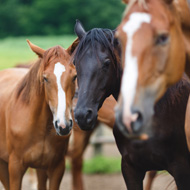Some horses 'genetically vulnerable' to sarcoid tumours

"By studying this phenomenon in horses you can learn about human cancer and vice versa."
Genetic differences could help to explain why the papillomavirus behind sarcoid skin tumours affects some horses and not others. A new international study suggests some horses may have a genetic susceptibility to the virus.
Sarcoid skin tumours are the most common type of cancer in horses. Recent research suggests variants of bovine papillomavirus has become adapted to horses and is likely to be the cause of most sarcoids, but little is known about why it affects some horses and not others.
Led by Cornell University, the research group compared the genetic make-up of horses with and without sarcoid tumours. They studied 82 UK and US horses with sarcoid tumours and 272 carefully selected controls that did not have sarcoids.
Looking at more than 50,000 sites in the equine genome, they found that regions on chromosomes 20 and 22 tended to be different in the horses with sarcoids. They say this provides evidence that a horse's genes determine, in part, how vulnerable it is to sarcoids.
The region of chromosome 20 that was associated with sarcoid development is within the part of the genome that is responsible for immune function - the major histocompatibility complex (MHC) class II region. This MHC type is very rare in standardbred horses, which scientists say could explain why sarcoids are diagnosed so infrequently in the breed.
Their research, which has been published in the International Journal of Cancer, mirrors findings in human studies. Tumours caused by human papillomaviruses account for more than 5 per cent of the world's cancer cases. Some people have been shown to have a susceptibility to these viruses, which can cause cervical and other cancers. In women with cervical cancer, a link has also been found with the MHC class II region.
Lead author Dr Doug Antczak said: "That should make a light bulb go off. It suggests there's a common mechanism in both species for susceptibility to tumour progression that may involve subversion of the host immune response. By studying this phenomenon in horses you can learn about human cancer and vice versa."



 The Federation of Independent Veterinary Practices (FIVP) has announced a third season of its podcast, Practice Matters.
The Federation of Independent Veterinary Practices (FIVP) has announced a third season of its podcast, Practice Matters.